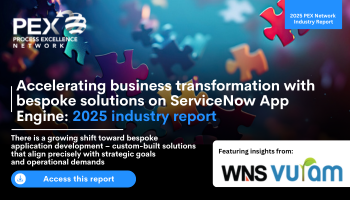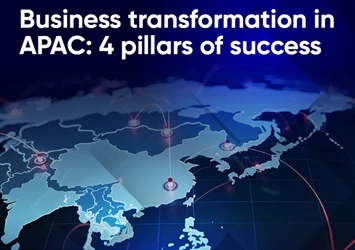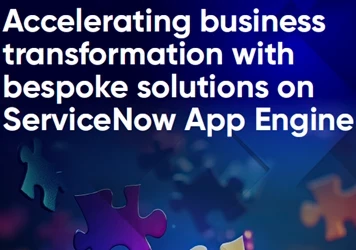Embracing uncertainty in business transformation
Instead of selling the image of certainty, business transformation leaders should treat learning as a series of probes into the unknown
Add bookmark
It’s never been more important for leaders to embrace uncertainty when pursuing business transformation. Upgrading your enterprise’s old tech stack into a new one is not a straight path where point A and point B are already mapped out.
The path is filled with uncertainty. If you’ve noticed uncertainty everywhere, that’s because it’s inherent. Rather than denying uncertainty, a better goal is to accept it and focus on preparedness.
Preparedness does not deny uncertainty. It actually acknowledges that uncertainty exists. It involves building the capacity to respond when things are in disarray. For some people, this is a daily occurrence for their teams. No matter how they feel about certainty, they cannot know the answers in advance, especially when introducing new technology to the company. The best they can do is test and figure out what works and what doesn’t, and do that quickly.
Join the PEX Network community

Don't miss any news, updates or insider tips from PEX Network by getting them delivered to your inbox. Sign up to our newsletter and join our community of experts.
Learn MoreResisting the urge to deny uncertainty
In the past, researchers assumed there was certainty in the problem-solving process. They conceived humans as information-processing machines, believing that problems were recognizable and had clear solutions. Every problem had a “means” and an “end.”
Today, this means-ends approach can no longer keep up. Problems don’t fit neatly together like a Lego set. When faced with uncertainty, the problems that companies face often have no clear means or end.
What makes a good leader? What is an effective healthcare policy? How should we define performance? What appears to be a solution to these questions is really a proposal. If clear-cut solutions existed, political parties wouldn’t need to spend hundreds of millions on campaigns.
To deny uncertainty is naïve, yet denial is often the only fallback tool for unprepared teams. They encounter uncertainty and panic. They become overwhelmed by the discomfort of something that looks unfamiliar and perceive this discomfort as a risk. Then, they try to manage it through simple frameworks and compliance forms. However, these forms can’t control what has not yet occurred.
For example, how can we know in advance an artificial intelligence (AI) roadmap when 98 percent of companies are still figuring out how to use it? Even Geoffrey Hinton, one of the pioneers of AI, is unsure about its long-term impact.
So why do people deny uncertainty despite it being ineffective? It’s because selling certainty feels safe. It reassures stakeholders that they understand the problem and can make a rational decision. Few question this assumption by asking “How do you know that?” or “Based on what evidence?” There’s nothing wrong with a personal or spiritual belief, but in this case, it is not spiritual. This is the denial of uncertainty in the hope of convincing people that certainty exists.
A simple question for readers: If I’m certain penguins can fly, does that make it true? We must actively question assumptions like these so strategy can be built on the right foundations.
Register for All Access: AI in PEX 2026!
Discovering choices
When banks began their AI journey, they may have been driven by the promise to revolutionize every aspect of financial services. After much tinkering and experimentation, many discovered that one of its strongest applications might simply be replacing call centers.
Investing in a new capability does not automatically lead to success. It is only after we test something that we know of its benefits. Banks are arguably filled with data, but in the end, their use cases for data were specific to areas like credit risk, document and policy processing, and fraud detection. Even though a vision to ‘automate everything’ sounds good, that vision still has to be grounded in what works.
Preparedness isn’t about the technology itself. Investing in preparedness means accepting uncertainty and the need for experimentation. When innovative companies come up with those ‘ah-huh’ moments, they have done so by going back and forth with the problem and reinterpreting it repeatedly. The hardest part is being disciplined enough to do this consistently.
Join us at All Access: Change Management 2026!
Getting comfortable with multiple goals
Transformation managers might not think of themselves as entrepreneurs, but they do face the same pressure of multiple goals, just like entrepreneurs. The media has created an image of a single goal. In reality, behind each apparent goal lie many more.
Large companies often have product portfolios with strategic goals that conflict with one another. Consider SpaceX and Tesla: space travel and electric cars have nothing to do with each other. They don’t complement each other the way Facebook and Instagram do through cross-promotion or Marvel and Disney do through shared audiences. The decision to pursue spaceflight wasn’t simply Elon Musk saying “yes or no.” Even if he said “yes,” the decision involved multiple goals from regulatory bodies like NASA and the European Space Agency.
Similarly, the US$4 billion Disney–Marvel merger required long negotiations with competing goals on each side. Disney’s values trace back to the 1940s; Marvel’s to the 1960s. Decades of corporate history shaped each company. Each organization had strong structures around what their characters (products) represented, yet both needed to learn, adapt, and expand. Multiple goals were already embedded as they explored new paths to profitability. Marvel embraces this so much that they release films in stages. They realize that some superhero films become blockbuster hits, and others do not.
The idea that companies have one goal may have been true in the early stages. We’ve all heard stories of founders in garages or dorm rooms, but we often stop at the individual and overlook the multiple goals behind their decisions. Strategic decisions are rarely binary. Preparing for multiple futures is more valuable than betting on one ‘clear’ path.
Denying uncertainty doesn’t improve decisions
Transformation leaders often hope for a smooth progression, jumping from one stage to the next. However, that level of certainty doesn’t exist in the real world. Whether due to risk aversion or political motives, denying uncertainty doesn’t improve decisions. It is ineffective because it assumes problems are well-defined and optimal solutions exist. That might work in computer programming, but not in real life.
If you had to learn another language, would you expect a perfectly trending growth line on a chart? Far from it. Most people learn on and off depending on motivation and usage. Someone may struggle for years, then move to another country and rapidly become fluent. Their path is not a neat trend line. Yet, they learned in the end.
Instead of selling the image of certainty, leaders should treat learning as a series of probes into the unknown. Some experiments will confirm assumptions, while others will reveal blind spots or dead ends. The value lies in accepting uncertainty and being prepared to move when the situation requires it.
Accelerating business transformation with bespoke solutions on ServiceNow App Engine

Today, off-the-shelf software solutions offer diverse features that enable vast opportunities to implement and maintain business transformation. However, in some circumstances, capabilities lack the flexibility and specificity required to address the unique challenges and workflows of individual organizations. As a result, there is a growing shift toward bespoke application development – custom-built solutions that align precisely with strategic goals and operational demands.
Download this report to explore how enterprises can harness the power of custom applications to drive meaningful transformation. With the growing adoption of low-code platforms like ServiceNow App Engine, organizations are building custom applications faster and with greater control. By empowering both IT professionals and citizen developers to build tailored solutions, organizations can significantly reduce time to value while maintaining control over quality and compliance.
Download Now














